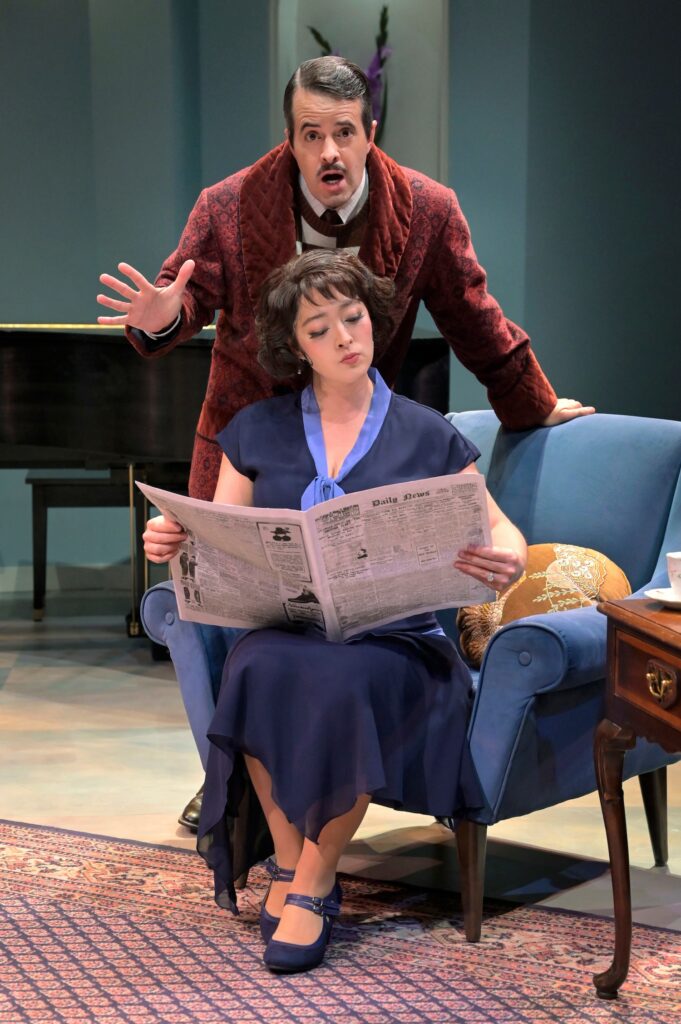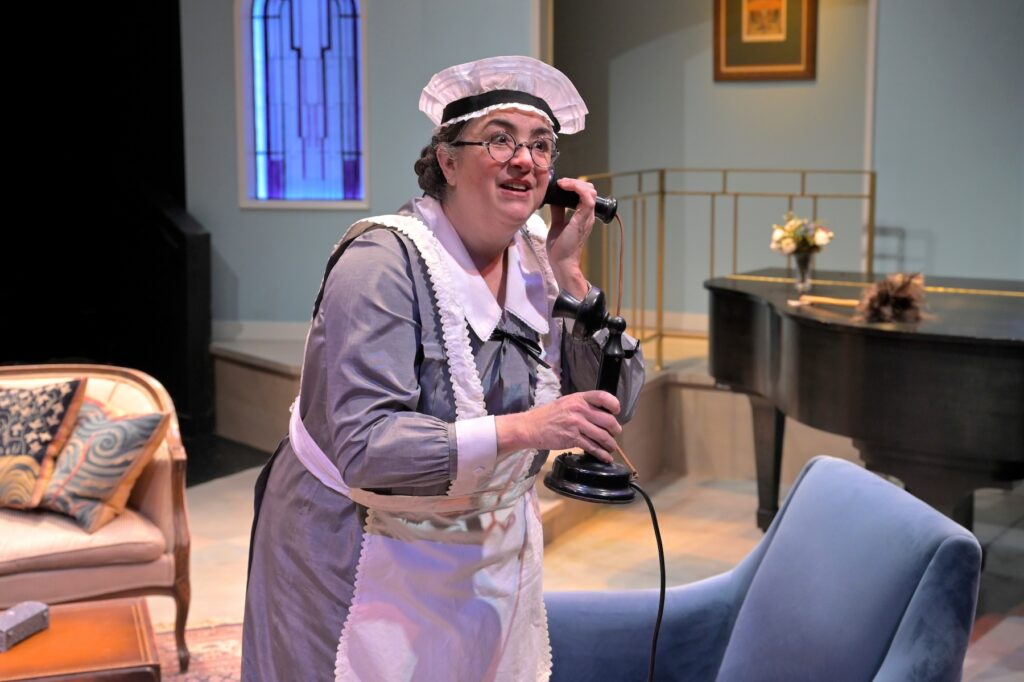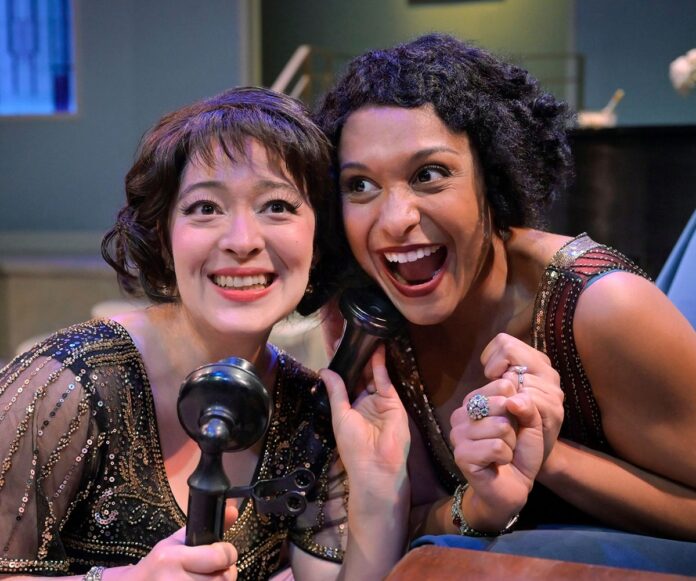One has to hand it to Noël Coward: 125 years after his birth, the late author’s plays are no less horny than they were when performed a century ago. This is the second notable Bay Area production within a month to mark the late author’s quasquicentennial by reviving one of his bawdy rom-coms. Whereas ACT’s take on Private Lives added much-needed diversity in its examination of toxic relationships, it still reveled in the sweat-inducing lust streaming down the stiff upper-lips of prim ‘n proper Brits. If Aurora Theatre’s selection is (debatably) less scathing in its relationship commentary, it turns up the “thirst trap” factor to near-Zalman King levels.
Yes, Fallen Angels (through November 17 at Aurora Theatre, Berkeley) is the century-old randy tale with which Aurora chose to open their new season. With much of last season spent worried about shutting their doors forever—something depressingly common these days—one can be forgiven for thinking that the revitalized libidos of its lead characters might mirror the equally-revitalized drive of the Berkeley-based theatre company.
It’s England in the Roaring ‘20s, but after five years of marriage, spouses Fred and Julia Sterroll (Michael Barrett Austin and Kina Kantor, respectively) have calmly settled into what Fred calls a “sublime plane of companionship.” There are no shocks, no surprises, nor any major reaction to finding out another well-off couple are divorcing, something Fred thinks Julia would never do to him. The only change in the status quo in their flat (with its gorgeous Art Deco design and muted pastels by Mikiko Uesugi) has been the introduction of a new maid, a jill-of-all-trades named Jasmine, but whom the couple call “Saunders” (Cindy Goldfield). As Fred heads out for a golf trip with good friend Will Banbury (Kevin Clarke), he does so knowing his banal marriage is as secure as it ever was.

No sooner have the boys stepped out the door when we witness the arrival of Willy’s wife, Julia’s lifelong best friend Jane (Emily Newsome). She’s in a bit of a panic for reasons she can only share with Julia: Jane’s received a postcard from Maurice, the dashing Frenchman who wined, dined, and yes, bedded both ladies years prior. The mere mention of his name is enough to bring back memories of his athletic bedroom prowess, something both ladies have been missing from their milquetoast marriages. The feeling only intensifies when a postcard arrives for Julia. Tempting though it may be, the ladies are committed to their marriages and have more than enough self-control to reject the lurid advances of an old French flame.
So they tell themselves.
I’ve rarely heard an audience laugh as hard as I did on opening night, when Jane, seemingly resigned to a boring marriage, asks, “Wouldn’t it be awful if a tree fell down and killed Fred and Willy on the golf course?” It’s not only a testament to the enduring skill of Coward’s pen, but also to the pitch-perfect direction of Tom Ross and the spot-on deadpan delivery of Newsome. All are in perfect sync to deliver a line with the right amount of timing and subtext, showing a full understanding of character and a respect for the audience.
Best of all, this is typical of the entire two-plus-hour runtime. Ross’s ensemble, from the harumphs of Fred and Willy to the knows-she’s-smarter-than-these-rich-idiots nuance of Saunders, all deliver top-notch performances that keep one’s eyes glued to the stage at every moment. If Joel Roster seems like the odd man out as the inevitable personification of Maurice, it’s not due to lack of talent, but rather that Coward so built up the character that no mere mortal can possibly live up to the idea of an irresistible French sex god. He’s like Helen of Troy, but eats croissants.
Yet, the show indisputably belongs to its two leading ladies. Cheeky title notwithstanding, Coward’s script isn’t out to slut-shame “loose” women, but to seemingly celebrate them and encourage them onto an extra-marital tryst. “It’s unfair that men have the monopoly on wild oats,” laments Julia. “They haven’t,” Jane reassures her, “but we let them think we do.”

I can’t recall having seen much from Berkeley Shakes co-founder Emily Newsome, but this show is a fine introduction to her talents. She not only nails the comedic subtleties of Jane (watching her try and fail to speak in code in front of Saunders is priceless), but also the heart of the character, giving a sense of history that feels genuine. When Jane lashes out at Julia, Newsome imbues a shared history in the duo’s rapport, spewing the exact words she knows will cut deep into her oldest, dearest friend.
Speaking of whom: Kina Kantor has spent the last few years proving herself an invaluable presence on Bay Area stages like SF Playhouse and the Magic. When the lights rise at the top of the show, the barely-contained disdain she gives Julia for Fred signals the start of another memorable performance from the reliable actress. There was a moment opening night when she was so into Julia’s emotional delivery that she accidentally popped the mouthpiece off the candlestick telephone. She briefly tried to restore it to no avail, but never once broke character or lost the flow of dialogue in the lines that followed. It was one of those mistake moments that reveal an actor who fully invested in the moment, which allows the audience to do the same. In other words, it’s one of the reasons we love live theatre.
As usual, I often felt like the only masked audience member on opening night. Yet, if I’m not mistaken, a few others who put on masks—just a few—may have done so specifically after seeing me in my Flo Mask and safety glasses, as those folks certainly weren’t masked when they sat down. My Aranet4’s CO² readings peaked at about 1,888ppm near the end of the second act, dropping down to 1,865ppm by the final bow. (Streaming performances begin November 12.)
With feminine sexuality a defining political issue this election season, it’s both disappointing and refreshing to experience such a progressively sex-positive work nearly a century after its premiere. With a strong combination of assured direction, fine-tuned performances, and dialogue that hasn’t lost any of its bite, Aurora’s 2024-25 season premiere—one of the year’s best shows —not only justifies the company’s rescued existence, it practically serves as foreplay for any couples in attendance. No wonder the characters smoke so much.
FALLEN ANGELS runs through November 17 at Aurora Theatre, Berkeley. Tickets and further info here.







